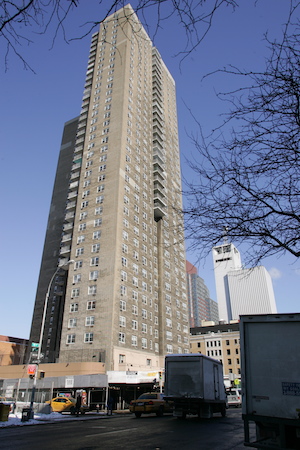
Section 8 tenants at Hudsonview Terrace are at odds with the landlord, over rents that exceed half their annual income.
BY SAM SPOKONY | Low-income tenants at a Hell’s Kitchen building say the landlord is forcing them to pay unfair rents that are higher than what they agreed to under a city-subsidized housing program. Dozens of those residents at Hudsonview Terrace — a 38-story, 396-unit tower at 747 10th Avenue, between West 50th and 51st Streets — entered the Section 8 enhanced voucher program after their formerly Mitchell-Lama building was bought out by a private owner, Empire State Management, in 2003. At that time, the city’s Department of Housing Preservation and Development (HPD) and the landlord reportedly granted those tenants what they thought would be a good deal — keeping them in the building, even as a large number of market rate tenants moved in alongside them. “In 2003, we were told [by both the city and the landlord] that our rent would be 30 percent of our annual income,” said Kelly Ann Junior, one of Hudsonview’s Section 8 tenants. But Junior says that she’s now paying more than 50 percent of her annual income for her one-bedroom apartment, after HPD approved Empire’s numerous rent increases. Other Hudsonview tenants — some of them seniors living off Social Security checks — are suffering similar or worse financial burdens, according to a lawsuit filed this past year in State Supreme Court by the Section 8 tenants against both Empire and HPD. One senior, who lives in a one-bedroom that now rents for just over $2,300 per month, said in the suit that she’s been ordered to pay 60 percent of her income. Another elderly resident said the rent on her two-bedroom apartment has, since 2011, been $3,300 per month, of which she is forced to pay nearly $1,350 per month — adding up to around 53 percent of her annual reported Social Security Disability income. Some market rate tenants at Hudsonview now allegedly pay rents that are actually lower than those of voucher tenants — with the suit claiming that the landlord is doing so in order to use the additional city subsidies to pad its own pockets. Aside from pulling away money from HPD’s already cash-strapped Section 8 program, that difference would violate another agreement from the 2003 Mitchell-Lama buyout, namely that rents charged to voucher tenants should not exceed those of their market rate counterparts. As evidence, the suit claims that in 2011, a market-rate tenant in a two-bedroom apartment was granted a major concession by the landlord and was allowed to pay only $1,266 per month in rent — even less than the aforementioned voucher tenant, who was reportedly paying around $100 more. “It’s a clear violation of the agreement, and it’s unconscionable,” said Junior. “It doesn’t just rip off the tenant; it rips off the government.” Empire State Management did not respond to a request for comment. Junior stressed the alleged government rip-off because, as all this is going on, HPD’s Section 8 program has faced deep budget cuts over the past year (as a result of the federal sequester), and in recent months the agency has said it may even have to start revoking vouchers if the federal government doesn’t grant it $400 million in new funding this year. Junior and her lawyer, Robert Katz — who represents her and the other tenants in the aforementioned lawsuit — believe that better HPD oversight of landlords like Empire would cut down on waste and help keep more stable funding within the Section 8 program. “The landlord here is really just subsidizing the market-rate tenants at the expense of HPD,” said Katz. HPD declined to comment, instead deferring to the city’s Law Department, which responded by citing the result of a previous lawsuit filed by Katz on behalf of the Hudsonview tenants. That 2011 suit, which also named as a defendant the U.S. Department of Housing and Urban Development — the federal agency that oversees and funds HPD — was dismissed by a federal judge. “Having prevailed in the federal district court, we believe the [State] Supreme Court will find HPD’s actions to be proper,” said Ilyse Sisolak, senior counsel for the city’s Administrative Law Division.
Read more: Safety Concerns Persist at Roosevelt Park One Year After Murder

































